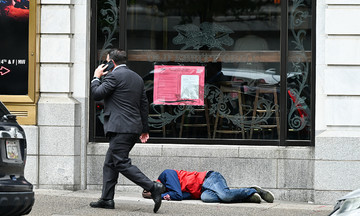After graduating with a fine arts degree from California State University in 12/2023, 25-year-old Grace Ahn hoped to find a job in marketing.
She submitted around 20 job applications daily. While waiting, Ahn worked at a gym, emptying trash, reorganizing weights, and assisting with membership sales. Despite calling companies and messaging human resources representatives on LinkedIn, she remained unsuccessful.
Eventually, she accepted a social work position with a government contractor in Orange County, California, earning 22 USD per hour, despite feeling underemployed.
Josue Leon, from Fort Worth, Texas, recently graduated with an engineering degree from the University of Pennsylvania and has applied for over 200 jobs since April. In many cases, he didn't even receive a response. Leon is currently staying with his girlfriend's family and relying on credit cards.
"It's been a nightmare," he said.
However, when Leon did receive a job offer, he declined it. The position required him to relocate to Massachusetts, but the company offered no relocation assistance, and the five-figure salary wasn't enough to cover his living expenses.
"It's tough when you're moving to Massachusetts with almost no money in your pocket," Leon explained. He ultimately accepted a job in Fort Worth, allowing him to stay close to home, even though it wasn't his ideal position.
Observers suggest that individuals like Ahn and Leon are trapped by "golden handcuffs." They have jobs or housing considered stable, clinging to them rather than risking significant career or relocation changes.
For generations, Americans readily pursued new job and housing opportunities, even if it meant moving across cities or states. US companies often hired and fired employees more frequently than elsewhere in the world.
During the 1950s and 1960s, around 20% of Americans moved annually. However, this rate has steadily declined, partly due to an aging population less inclined to relocate. The increasing prevalence of two-income households also complicates relocation.
In 2019, the year before the Covid-19 pandemic, 9.8% of Americans moved. During the pandemic, relocation away from workplaces or to more distant suburbs increased significantly. But this surge was short-lived. In 2023, only 7.8% of Americans moved, the lowest rate since the US Census Bureau began tracking the figure in 1948.
The percentage of Americans moving to new homes or cities is at a record low. Companies have fewer entry-level positions available. This situation leaves many stuck in cramped housing or living in their parents' basements while job hunting.
Those employed are holding onto their jobs, reluctant to switch even if they dislike their current work. Economists worry that this "immobility" threatens America's characteristic dynamism and has economic consequences for everyone.
 |
A young couple in the US looking to buy a house. Photo: Money.com |
A young couple in the US looking to buy a house. Photo: Money.com
The frozen housing market prevents growing families from upsizing, retirees from downsizing, and first-time buyers from entering the market.
Brandon and Katherine Righi purchased their 102 m2 house in suburban Summit, New Jersey, in 2017, with a 3.6% mortgage. At the time, they had one young son.
"The plan was to stay here for five to seven years and then move to a bigger house as our family grew," said Brandon, who works in consulting.
Now, the couple has three sons under 10 but can't move, despite their cramped house. They keep their toaster oven in the dining room and pantry staples like pasta and beans in the basement.
Few larger homes are on the market in their town, and those available are expensive. With current New Jersey mortgage rates around 6%, a larger home would at least double their monthly payments. They've had to abandon their plans.
When Bob and Ann Ruffatto moved into their suburban Chicago home 35 years ago, they had two school-aged children. Now, their children are grown and have moved out, but the Ruffattos remain in their 223 m2 house in a good school district, though they no longer need it.
"I’m in a house that should be occupied by a family with young children," Bob said. "I’m taking their place."
Bob has paid off his mortgage and intends to buy his next house in cash, so high interest rates don't concern him directly. However, they still hinder him. The couple can't find a smaller home nearby, partly because many potential sellers are waiting for the market to improve.
In the 2010s, a middle-income family buying a median-priced home typically spent up to 30% of their income on housing, according to brokerage firm Redfin. Now, that figure is 39%. Last year, home sales fell to their lowest level in almost 30 years. Market research and consulting firm John Burns estimates that the percentage of US households moving to a different metropolitan area has fallen 29% since 2021.
When people can't relocate for job offers or to cities with better opportunities, their income often suffers. When companies can't recruit people from other states, productivity and profits can also be affected.
Recent graduates who don't find good jobs immediately often struggle to recover the lost income during unemployment. This widens the gap between the successful and unsuccessful in the economy.
"The decline in mobility is a big deal on multiple dimensions," said Chang-Tai Hsieh, an economics professor at the University of Chicago. His previous research showed that expensive housing prevented many US workers from relocating for better jobs, negatively impacting GDP. He believes this link may still hold true.
The US economy this year has performed better than expected. Consumers continued spending even as President Donald Trump imposed tariffs and conducted immigration crackdowns. However, GDP growth slowed in the first half of the year, and summer hiring was disappointing.
According to analysis by economist Abigail Wozniak and colleagues at the Federal Reserve Bank of Minneapolis, job-switching rates declined from the 1980s to the 2010s. Data from the Federal Reserve Bank of Philadelphia shows that in the late 1990s, the probability of a worker changing companies in any given month averaged around 2.8%. This figure fell to an average of 2.3% in the 2020s.
According to a survey by the Federal Reserve Bank of New York, workers are less optimistic than a year ago about quickly finding new jobs if laid off. In a recent poll by the job site Indeed, 50% of respondents said they were clinging to their current jobs to avoid the uncertainty of the labor market.
Guy Berger, a senior specialist at the Burning Glass Institute, which studies labor trends, said that weak hiring and fewer layoffs have made job searching significantly harder.
Recent research by the Burning Glass Institute shows that recent college graduates who don't find suitable jobs face triple the risk of unemployment a decade later compared to those who quickly secure good positions.
For Josue Leon, finding a technology engineering job close to home in Fort Worth was a stroke of luck after a difficult job search, as he never imagined finding employment would be so challenging. "I was always told that having a college degree guarantees a job," Leon said.
Leon is the first in his family to graduate from college. His father, an immigrant from Mexico, worked picking fruits and vegetables and later became a truck driver.
Leon is happy to stay in Texas, at least for now. While still living with his girlfriend's family, he has begun searching for his own place, but only in the vicinity.
Employers have noticed the trend of applicants being less willing to relocate. From 2022 to 2024, about 10% of jobs posted by the engineering division of staffing firm Kelly Services required relocation. Now, the figure is only around 2-3%.
Less attractive relocation packages are also a factor, according to Mark Saltrelli, vice president of recruiting for the division at Kelly Services. Employees with low-interest mortgages or those who received substantial stock options and bonuses during the post-Covid-19 boom are often reluctant to give them up.
"The golden handcuffs in the market are tighter than ever," Saltrelli said.
Rising costs have led many families to decide that both spouses must work. According to an analysis by John Jones, an economist and senior research advisor at the Federal Reserve Bank of Richmond, these families have the lowest mobility rates among all groups.
Craig Allen, 50, was laid off from a video game company in early July. He is looking for a new job but said it would be difficult to leave the Columbia, Maryland area, where he has lived since 2006. His wife's job requires her to stay nearby, and their youngest daughter has two more years of high school.
Allen is networking locally. He also plans to look for fully remote positions, which are not uncommon in the video game industry. "Moving to another city for work would be a last resort," he said.
 |
Left, Grace Ahn at her graduation ceremony at California State University, Long Beach. Right, Craig Allen and his wife on a cruise in the summer of 2024. Photo: WSJ |
Left, Grace Ahn at her graduation ceremony at California State University, Long Beach. Right, Craig Allen and his wife on a cruise in the summer of 2024. Photo: WSJ
Despite working as a social worker, Grace Ahn continues to apply for marketing positions. "At first, I was naive and excited. I thought the world was my oyster," she said. "But now, that excitement is gone."
Vu Hoang (According to WSJ, AFP, Reuters)












